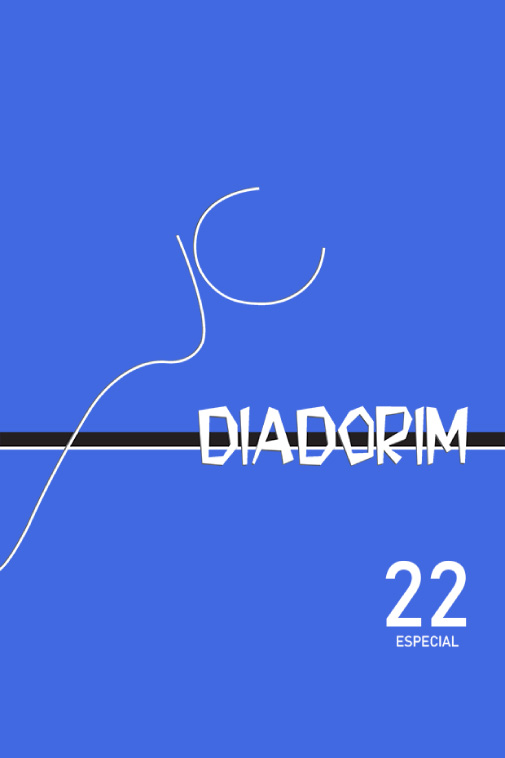Saint and prostitute: an analisys of Melania Sabiani in A pécora, by Natália Correia
DOI:
https://doi.org/10.35520/diadorim.2020.v22n3a36381Palavras-chave:
Feminine, Christianity, A Pécora, Natália CorreiaResumo
This article aims to analyze the figure of Melânia Sabiani, in its two versions, saint and prostitute, immolated by society represented in the play A pécora, by Portuguese writer Natália Correia. In the play, Correia portrays the society of Gal, a fictional city that witnesses the rise of a new saint among its residents, Santa Melânia, an event created to protect the young woman's secret affair with the local priest. While being worshiped by the people, Melânia is transformed into Pupi, the prostitute, excluded from the community in order to preserve the religious farce. These two faces of the main character will serve as a basis for our analysis of the feminine and its association with the religious context of the play. As a theoretical contribution, we will base our work on authors who explore the social evolution of women both in the historiographic and mythological realms, such as BARING and CASHFORD (2005), BATAILLE (1987), CAMPBELL (1976) and WHITMONT (1991). In the Lusitanian piece, it is possible to perceive the completely opposite forms of how the feminine is seen within a religious context such as that reproduced in the work. Based on the dogmas and principles of the Christian tradition, we find two antagonistic versions of the woman in the images of the saint and the prostitute. While one is praised and serves as a model to be followed by everyone, the other is rejected and excluded from the social environment for being a reason of shame and degradation. When analyzing the representation of the feminine in Natália Correia's work, we realize that, in Gal, there is only salvation for those who adapt to the models imposed by patriarchal religious power, making empowerment and emancipation in the face of this system virtually impossible.
Referências
BATAILLE, Georges. O erotismo. Porto Alegre: LP&M, 1987.
CAMPBELL, Joseph. The masks of God: Occidental Mythology. Harmondsworth: Penguin Books, 1976.
CLARK, Stuart. Pensando com Demônios: A Idéia da Bruxaria no Princípio da Europa Moderna. São Paulo: EdUsp, 2006.
CORREIA, Natália. A Pécora. Lisboa: Publicações Dom Quixote, 1983.
KARLSEN, Carol F. The Devil in the shape of a woman: Witchcraft in Colonial New England. New York: Norton, 1998.
KRAMER. Heinrich & SPRENGER, James. Malleus Maleficarum. Nova York: Dover, 1971 Disponível em: <http://www.malleusmaleficarum.org/downloads/MalleusAcrobat.pdf>. Acesso em 29 de maio de 2020.
PAGE, Sophie. Medieval Magic In: The Oxford Illustrated History of Witchcraft and Magic; Org. Owen Davis. Oxford: Oxford University Press, 2017.
RICHARDS, Jeffrey. Sexo, desvio e danação. As minorias na Idade Média. Rio de Janeiro: Jorge Zahar Editor Ltda, 1993.
SIMPSON, Duncan. A Igreja Católica e o Estado Novo Salazarista. Lisboa: Edições 70, 2014.
WHITMONT, Edward C. Retorno da Deusa. 2 ed. São Paulo: Summus, 1991.
Downloads
Publicado
Edição
Seção
Licença
Transferência de direitos autorais - Autorização para publicação
Caso o artigo submetido seja aprovado para publicação, já fica acordado que o autor autoriza a UFRJ a reproduzi-lo e publicá-lo na Diadorim: Revista de Estudos Linguísticos e Literários, entendendo-se os termos "reprodução" e "publicação" conforme definição respectivamente dos incisos VI e I do artigo 5° da Lei 9610/98. O artigo poderá ser acessado pela internet, a título gratuito, para consulta e reprodução de exemplar do artigo para uso próprio de quem a consulta. Essa autorização de publicação não tem limitação de tempo, ficando a UFRJ responsável pela manutenção da identificação do autor do artigo.

A Revista Diadorim utiliza uma Licença Creative Commons Atribuição-NãoComercial 4.0 Internacional (CC BY-NC 4.0).

